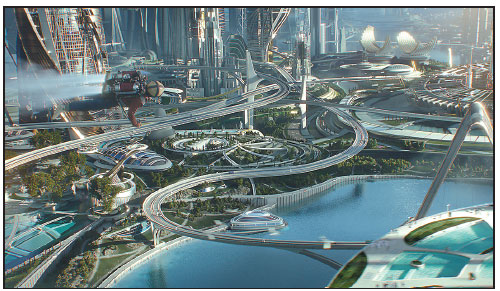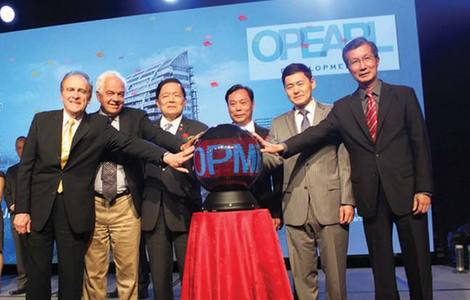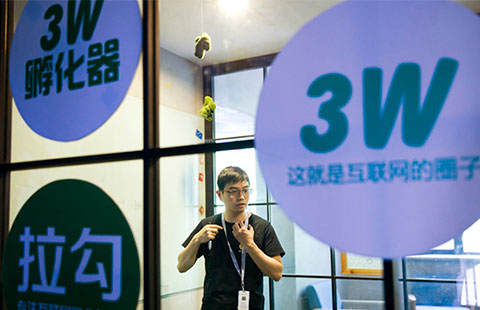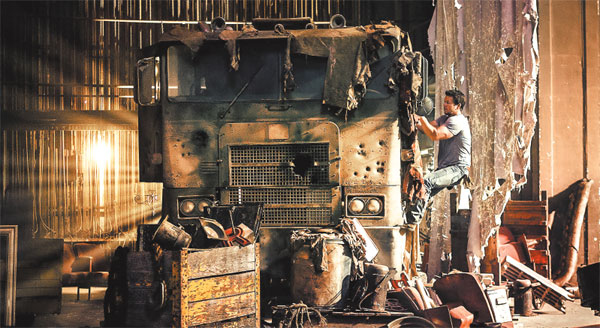Hollywood's second chance
Updated: 2015-06-11 07:57
By Xu Fan(China Daily)
|
||||||||
After struggling in the US box office, many films become surprise hits in China, but can the trend continue? Xu Fan reports.
Has China become the knight in shining armor to save Hollywood flops?
That question, posed by a recent article in business magazine Forbes, is raising eyebrows from blockbuster enthusiasts and industry insiders in the world's second-largest cinema market.
In a story headlined "Can China save Disney's Tomorrowland?" Forbes suggests the Middle Kingdom has become a second-chance "haven" for big-budget Hollywood productions that have struggled in their own markets.
The article even predicts the sci-fi movie Tomorrowland may be saved by the Chinese market, although this is beginning to seem unlikely.
Despite the film's major stars, George Clooney and Brittany Robertson and director Brad Bird flying to Shanghai to build up hype ahead of the Chinese mainland premiere, the movie only grossed a soft 15.7 million yuan ($2.5 million) on the first day of release on May 26.
Compared to the 220 million yuan taken by Marvel's superhero flick Avengers: Age of Ultron, and 88 million yuan taken by Japanese animation Stand by Me Doraemon, the $190 million Tomorrowland is regarded as receiving a "so-so" reception by Chinese industry insiders.
With an average score of only 6 out of 10 on several major movie-review websites, the movie, having the same name with a theme land in the Disneyland resort, has been criticized by many moviegoers for looking like "an extended version of an advertisement" to promote the amusement park.
Although China may fail to rescue Tomorrowland, the massive Chinese market, which sold 830 million tickets in more than 5,100 cinemas nationwide to gross a record box office of 29.6 billion yuan last year, has been known to save other big-budget Hollywood movies that had poor receptions in the North American and European markets.
The first Hollywood movie to be "saved" by the Chinese market is widely recognized as the sci-fi film Pacific Rim.
The movie suffered a 52-percent box office slump in North America in its second week in July 2013. Surprisingly, it had something of a "miracle" comeback in China, dominating the box office for three weeks and grossing 600 million yuan, making China the film's largest overseas market.
The 2014 sci-fi blockbuster Transformers: Age of Extinction, or Transformers 4 also enjoyed success in the Chinese market. Although it was given the worst picture award at the 35th Golden Raspberry Awards, the negative feedback did not stop it from becoming the second highest-grossing film in the history of Chinese cinema, making nearly 2 billion yuan.
Many Chinese movie fans complain that the "upside-down" success of these films is because they only get a limited choice of good foreign movies. This is because China only allows 34 foreign titles to have a cinematic release each year. Critics predict the trend of Hollywood flops finding a second life in China may be short-lived.
"China's movie market is expanding too fast. The major moviegoers in third-and fourth-tier cities don't really care if the movie tells a good story. They will take out their wallets just to admire the visual effects and spectacular scenarios," says Zuo Heng, deputy director of cinema studies at China Film Archives.
He adds that the skepticism over the popularity of foreign box office bombs will "wake up" some moviegoers and raise their appetite for good stories.
"After a round of fierce debate, people start to realize they can have better choices," he says.
China Daily film critic Raymond Zhou likens the current phenomenon to the boom of the 1980s, when most Chinese only trusted foreign household appliance brands. Zhou also predicts the number of "undiscriminating" audiences will shrink in the years to come, when they grow tired of commercial titles with mediocre plots.
Cultural differences can also go some way in explaining the phenomenon.
"Science fiction movies are a hit genre in North America. Take Transformers 4 as an example, many American fans are familiar with the original version and are familiar with the robots through comic books, the TV show and movies. They find it difficult to tolerate their beloved characters and classic plots in a new movie," says Er Ku, a Beijing-based film critic.
"But for the developing Chinese market, which is lacking a mature franchise, people are happy just to see their animated childhood favorites on the big screen, regardless if it's a good adaptation or not."
Contact the writer at xufan@chinadaily.com.cn
|
Top: Mark Wahlberg plays Cade Yeager in Transformers: Age of Extinction. The winner of the worst picture at the 35th Golden Raspberry Awards achieved great success in China. Above: Hollywood's scifi movie Tomorrowland premiered in China on May 26. It was hoped that the Chinese market would save the struggling film. Photos Provided To China Daily |

(China Daily USA 06/11/2015 page07)

 Across Canada(June 11)
Across Canada(June 11)
 US dollar inspired art to be auctioned at Sotherby
US dollar inspired art to be auctioned at Sotherby
 Coffee shop where Premier Li met entrepreneurs
Coffee shop where Premier Li met entrepreneurs Cavs edge Warriors to take charge of finals
Cavs edge Warriors to take charge of finals
 Work hard, play hard - five ways to shake off exam stress
Work hard, play hard - five ways to shake off exam stress

Six co-investments by Jack Ma and Pony Ma

 Yes, we are waiting for our children
Yes, we are waiting for our children
 Chinese artist to be recognized at International Muse Awards
Chinese artist to be recognized at International Muse Awards
Most Viewed
Editor's Picks

|

|

|

|

|

|
Today's Top News
Pentagon prepares to greet General Fan
US to continue engaging with China in foreseeable future
Suu Kyi begins groundbreaking visit
Michelle Kwan to work for Hillary Clinton campaign
China, US take fresh views on TPP and AIIB
G7 accused of ignoring the facts over South China Sea
Obama weighs sending several hundred more US troops to Iraq
MSCI delays including China A shares in benchmark index
US Weekly

|

|








